Cheetahs at CCF Namibia
The Resident Cheetahs at CCF’s headquarters in Namibia, shown below, are all available for sponsorship. These cheetahs came to CCF as orphaned young cubs, injured adolescents, or they were kept as pets and turned over as adults. For multiple reasons, resident cheetahs are not able to survive in the wild and therefore they cannot be released.
Cost: It costs approximately $6,500 CAD per year to feed, house, and provide medical care for each cheetah being cared for at CCF headquarters in Namibia. Sponsors receive exclusive updates on their sponsored cheetah twice per year in video format.
Click on the images below to read about each individual cheetah available for sponsorship.
Al Pacino
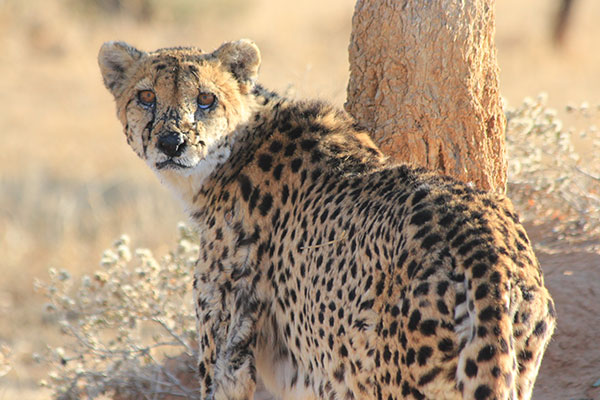
Al Pacino (male) was previously kept in captivity on a farm with three other cheetahs: one male named Scarface and two females, Old Lady and Marisa. In July 2021, the Cheetah Conservation Fund (CCF) was called to pick them up. The two males had many scars on their faces, hence their nicknames. The males were separated from the females, and sadly, Old Lady and Scarface have since passed away.
Aurora
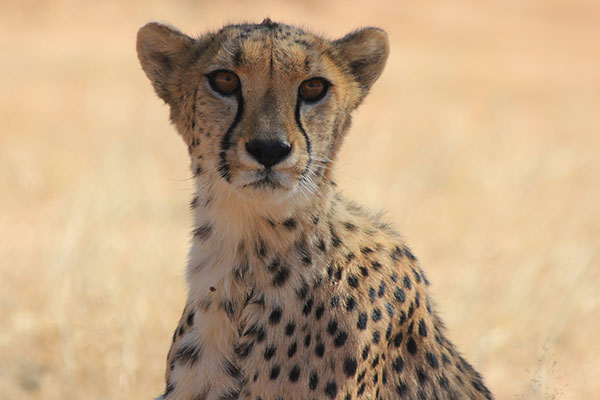
Aurora (female) was brought to the Cheetah Conservation Fund (CCF) as a cub in April 2013. A farmer found her without any sign of her mother and kept her for two weeks before calling CCF. When she arrived, her claws had been cut, she was malnourished, and extremely frightened. At CCF, she was introduced to another female cub, Rainbow, who arrived around the same time. The two have become companions and now share an enclosure.
Bella
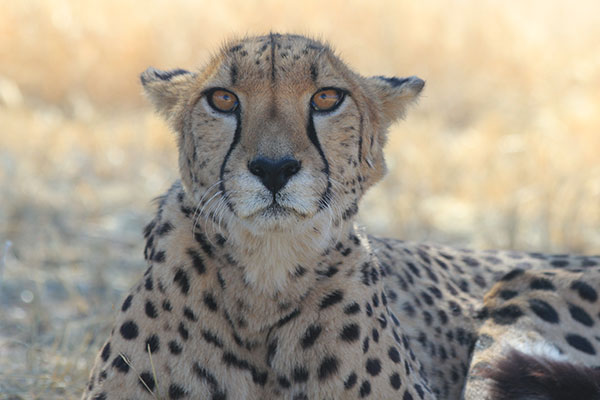
Bella (female) came to the Cheetah Conservation Fund (CCF) in December 2017. Bella was kept as a pet on a private farm with a male cheetah, Katiti. After not having permits granted to continue keeping them, the pair were handed over to CCF. They had a poor diet of chicken necks but were switched to a diet of red meat with vitamins and calcium supplements at CCF. Bella is very habituated to people, always purring when they are around. She is confident and learns quickly during training sessions. Bella and Katiti are inseparable, spending most of their days together exploring and meeting other cheetahs.
Delilah
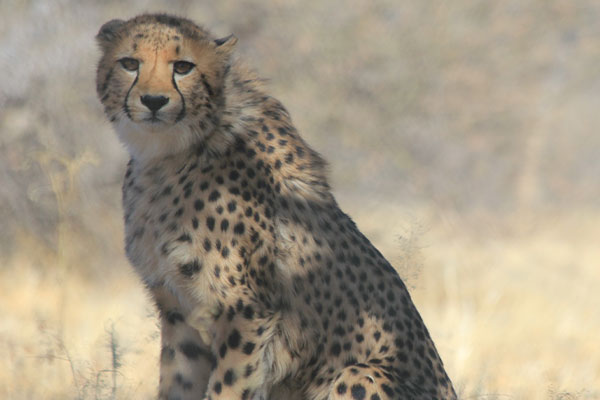
Delilah (female) is a cheetah and one of two cub siblings captured on a farm at approximately eight months old and brought to the Cheetah Conservation Fund (CCF) in December 2023. After a general veterinary check, including sample collection and measurements it was decided that she and her sibling, Mapenzi, will remain at CCF until they can be released when they reach two years of age.
Dominic
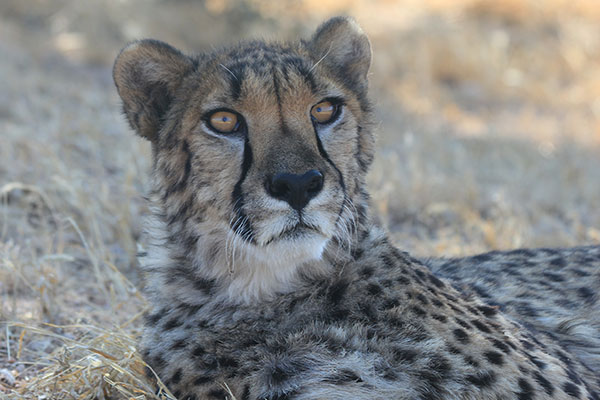
Dominic (male) was orphaned in the Khomas region of Namibia in May 2018. The Ministry of Environment Forestry and Tourism (MEFT) contacted the Cheetah Conservation Fund (CCF), and staff drove out to meet a farmer who reported that someone had dropped off a cub at her farm. The farmer had cared for the cub for about a week but became concerned when it started having health problems. Dominic was taken to a local vet for an initial assessment before being brought to CCF. At about 10-14 days old, his eyes had just opened, and he had no teeth. CCF staff prepared a nursery area for him and began feeding him a cat milk supplement every three hours. Dominic responded well to care and is now doing great.
Etango
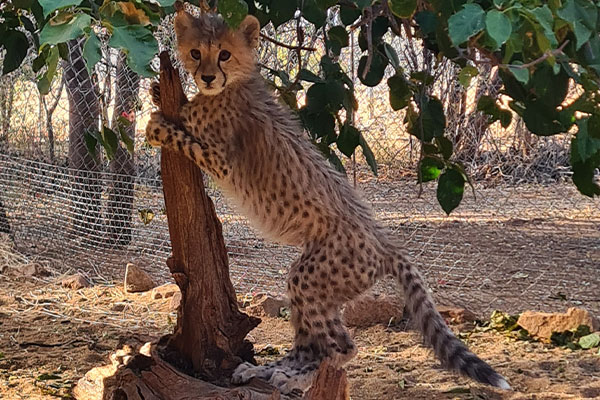
Etango (male) came to the Cheetah Conservation Fund (CCF) in April 2024 after being found near Otjiwarongo, Namibia. He was one of three seven-week-old cheetah cubs found without their mother by local workers. Despite efforts to save all the cubs, one of them died two days after arriving at CCF. Etango and his sibling Zephyr are recovering and healthy.
Hadassah
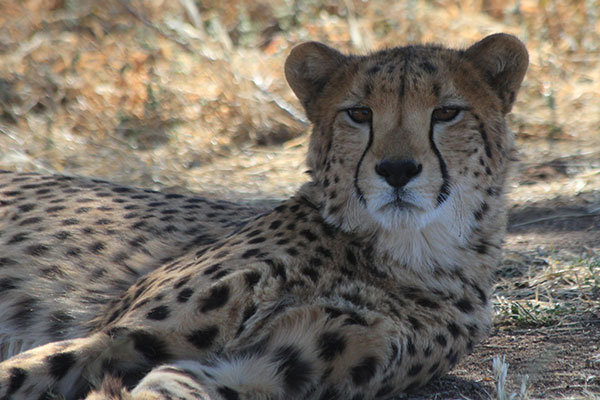
Hadassah (female) (formerly named Shy) is a cheetah and one of three orphaned cubs (Kora female and Teja male) born to a released female named Calypso. Calypso died from a snake bite shortly after giving birth, and the one-month-old cubs were rescued by CCF staff in March 2022. Hadassah was brought back to the main field center where she is being raised alongside her siblings and Kaveri.
Hamish
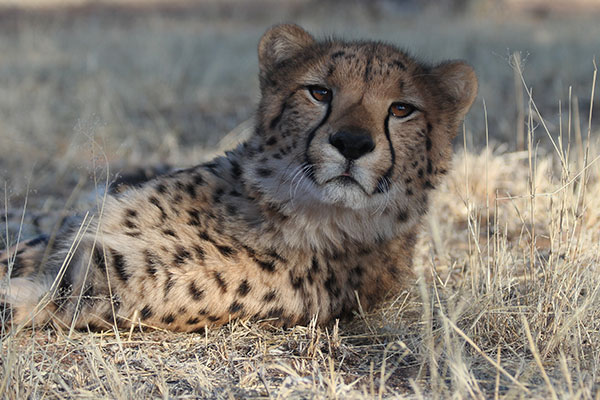
Hamish (male) and Kweli (female) were captured by a farmer in June 2023 after their mother died due to human-wildlife conflict. Sadly, a third cub died of starvation before reaching the Cheetah Conservation Fund (CCF). Hamish and Kweli are now living as permanent residents at CCF.
Hans
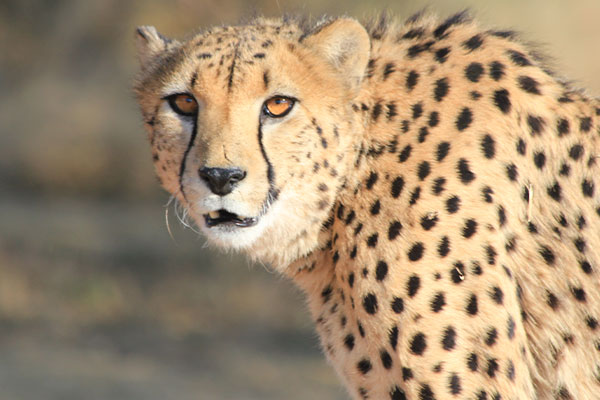
Hans (male) arrived at the Cheetah Conservation Fund (CCF) in 2020 after being caught in a capture cage. His family could not be found. He came from a farm in the Gobabis area and was transferred to CCF by staff with the help of the Ministry of Environment, Forestry & Tourism (MEFT). Hans was not in good shape after being in the capture cage for about a week. He has since healed and is now close with resident cheetah Rocket.
Jaya
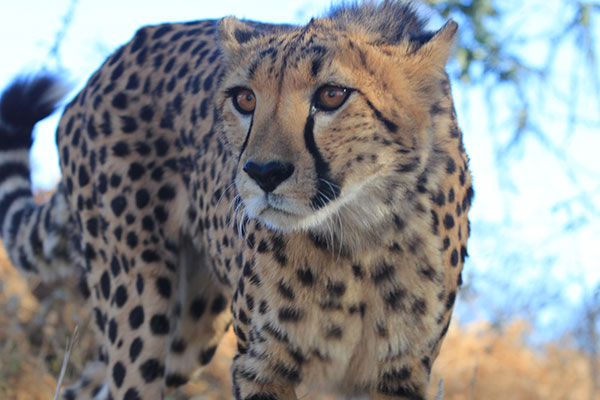
Jaya (female) was picked up by CCF staff in September 2019. A farmer had found her along the road next to her mother, who had been killed by a car. Jaya was still trying to nurse from her mother when found. The farmer took her home for a day to keep her safe before contacting CCF. Jaya has thrived at the Cheetah Conservation Fund (CCF), forming friendships with fellow orphaned cubs Rocket and Hans.
JEV

JEV (male) came to the Cheetah Conservation Fund (CCF) in November 2021 after losing his mom and siblings in a catch cage on a farm. Named after French racecar driver Jean-Éric Vergne, JEV loves food, which is used as motivation during his examinations and interactions. He is being socialized with other young cheetahs at CCF’s center in Namibia.
Katiti
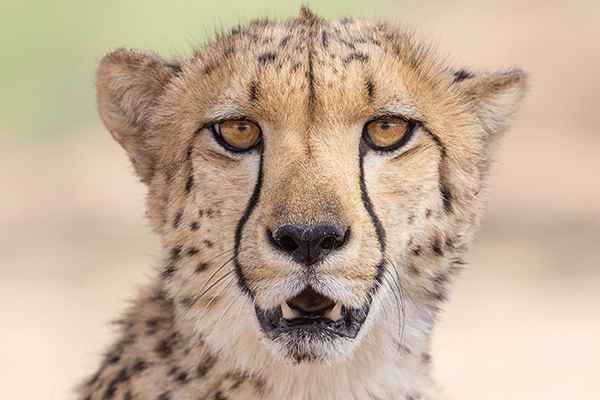
Katiti (male) came to the Cheetah Conservation Fund (CCF) in December 2017. Previously kept on a private farm with a very tame female cheetah, Bella, Katiti had been castrated a few months earlier. After not having permits granted to continue keeping them, the pair were handed over to CCF. Katiti had a poor diet of chicken necks but was switched to a red meat diet with vitamins and calcium supplements. He is quite shy and follows Bella around, gaining confidence with her and the keepers’ help. Katiti and Bella are inseparable, exploring and meeting other cheetahs together.
Kaveri
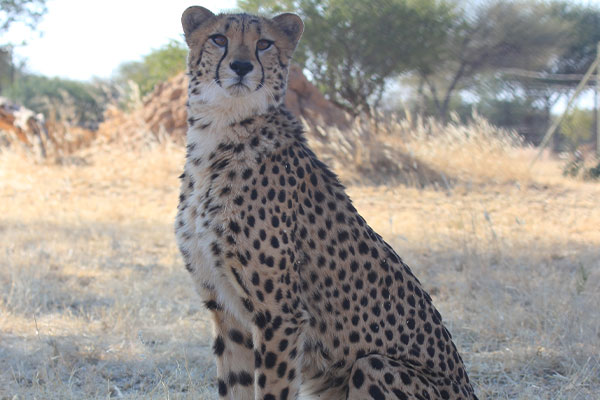
Kaveri (female) came to the Cheetah Conservation Fund (CCF) on August 9, 2022 from Farm Okatjomboa in Gobabis as an approximately two-month-old orphaned cub.
Khaleesi
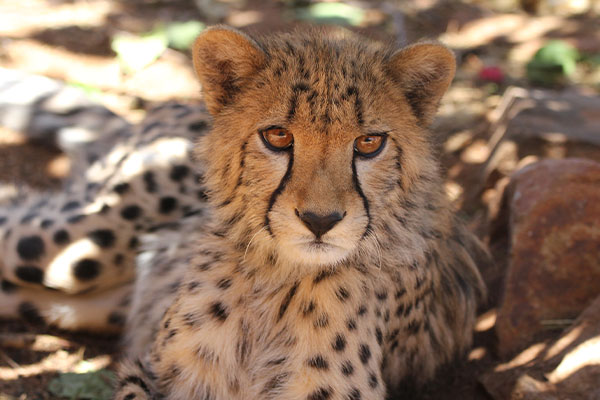
Khaleesi (female) came to CCF because of her mother, Daenerys, who was released in February 2019. In February 2021, CCF and Erindi Private Game Reserve staff noticed a problem with Daenerys’s tracking data and discovered she had a broken leg. While recovering at CCF, Daenerys gave birth to Khaleesi. Due to Daenerys’s injuries, she couldn’t properly care for her cub, so CCF staff stepped in. Khaleesi is now growing up as a resident cheetah at CCF’s headquarters in Namibia.
Kora
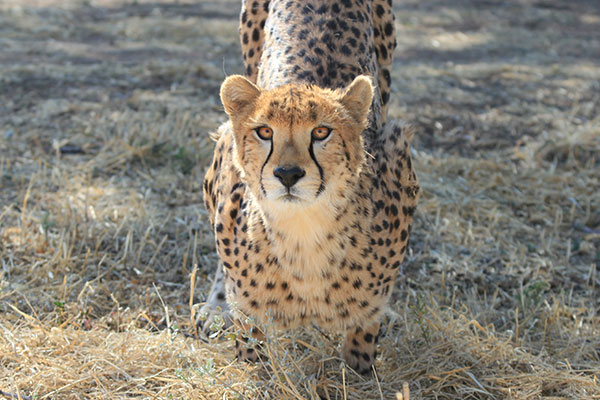
Kora (female) is a cheetah and one of three orphaned cubs (Hadassah, female – formerly named Shy, and Teja male) born to a released female named Calypso. Calypso died from a snake bite shortly after giving birth, and the one-month-old cubs were rescued by CCF staff in March 2022. Kora was brought back to the main field center where she is being raised alongside her siblings and Kaveri.
Koya
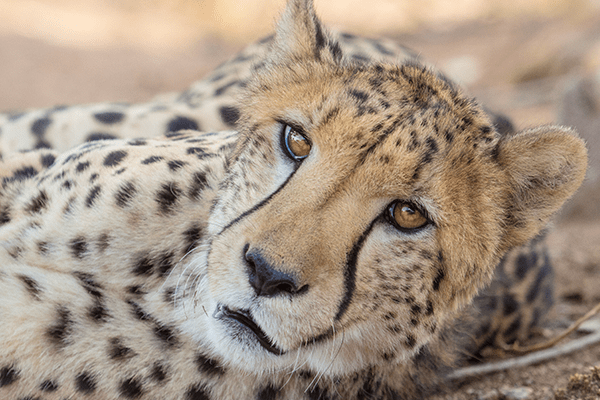
Koya (male) came to the Cheetah Conservation Fund (CCF) in July 2017 with his brother Niko. They were about six months old and had been kept in a small chicken coop for over two months after being captured and sold. The cubs were fed a poor diet and suffered from early-stage metabolic bone disease. Koya was very overweight due to lack of exercise but has since become very confident and enjoys stalking birds. He always greets his keepers for participatory veterinary training.
Kweli
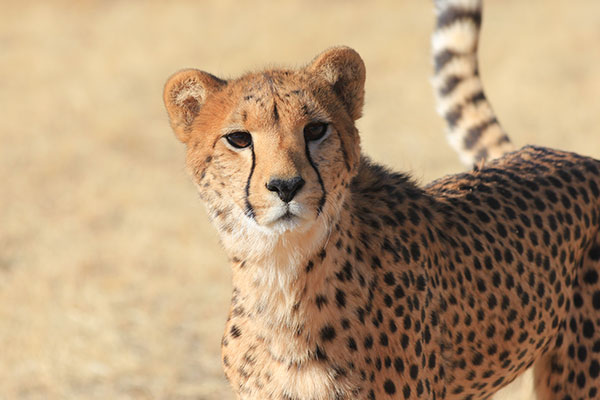
Kweli (female) and Hamish (male) were captured by a farmer in June 2023 after their mother died due to human-wildlife conflict. Sadly, a third cub died of starvation before reaching the Cheetah Conservation Fund (CCF). Kweli and Hamish are now living as permanent residents at CCF.
Marisa
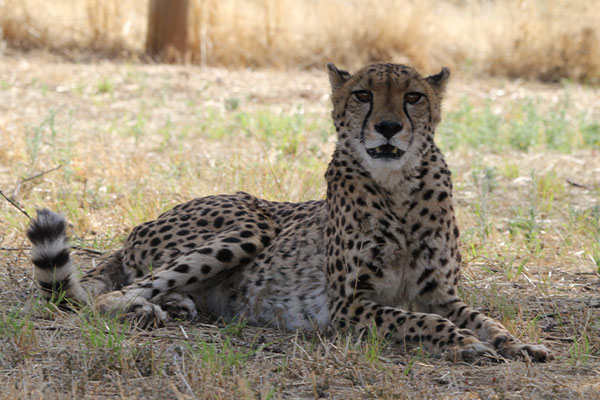
Marisa (female) came from a farm where she was kept in captivity with three other cheetahs: a female named Old Lady and two males, Al Pacino and Scarface. They were held on the farm for seven years until CCF was called to pick them up in June 2021. Marisa is very independent but lives with five other females in Elands Pen. She is a bit of a loner and very feisty.
Mapenzi
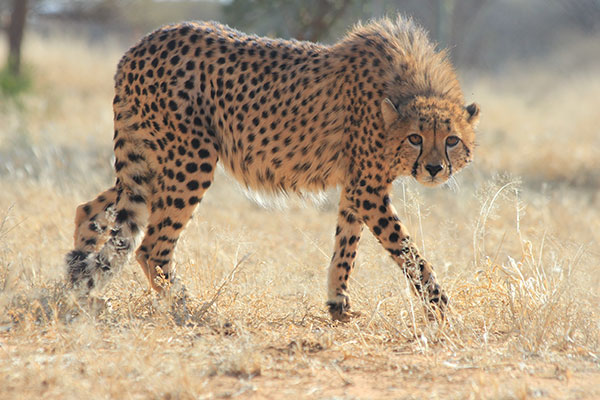
Mapenzi (male) is a cheetah and one of two cub siblings captured on a farm at approximately eight months old and brought to the Cheetah Conservation Fund (CCF) in December 2023. After a veterinary check in, it was decided that he and his sibling, Delilah, will remain at CCF until they can be released at two years of age.
Nandi
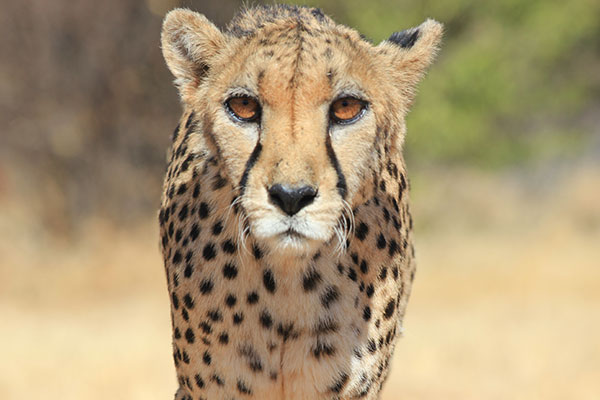
Nandi (female) was confiscated by the Ministry of Environment, Forestry, and Tourism (MEFT) from a lodge facility holding her without a permit and handed over to the Cheetah Conservation Fund (CCF) for continued care in August 2019. When she initially arrived, she was quite dehydrated. Despite receiving fluids and treatments, she stayed dehydrated, indicating a potential issue with her kidneys. Tests revealed very slight kidney failure, which is unusual for a cheetah of her age. She now receives fluids once or twice a week to stay hydrated, and her condition is being closely monitored.
Peter
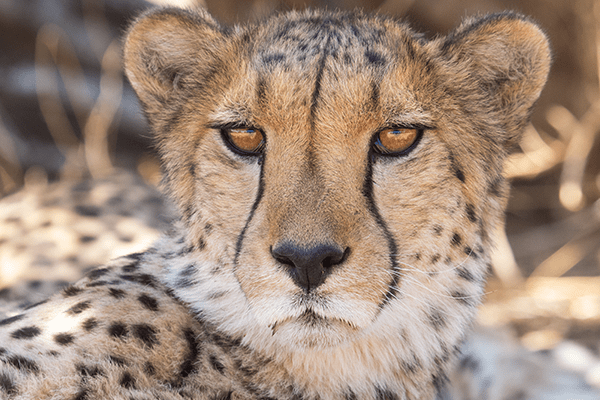
Peter (male) is one of the four Okakarara Cubs, which were brought to CCF when they were only a few weeks old in September 2010. Peter and his brother Khayjay and his sisters Senay and Tigerlily lived together and were being specially trained to be Ambassador Cheetahs. They served to teach visitors about the cheetah and its race against extinction. Peter works cooperatively with his handlers on his veterinary treatments and check-ups.
Polly
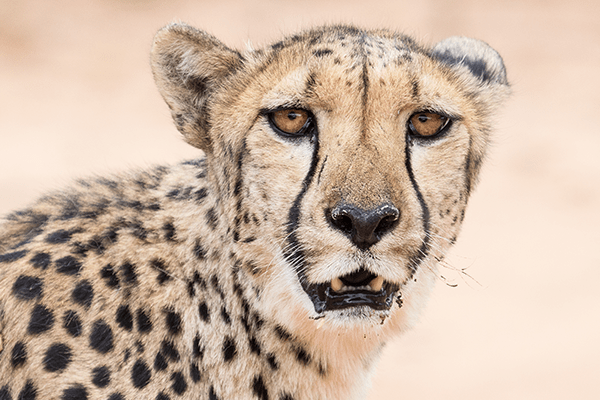
Polly (female) was being tracked by CCF via satellite radio collar through her mother. In September 2009, a farmer called to report that Polly’s mother was found dead. Knowing she had cubs, CCF worked with the farmer to set catch cages, and after about a week, Polly and her three siblings (Phil, Tony and Mischief), who were about three months old, were caught. Polly is the only female of the four cubs and is named after Polly Hix, a donor of CCF. When she was younger she was playful and loved to pounce on and wrestle her brothers. Now she mostly likes to relax in the shade.
Rainbow
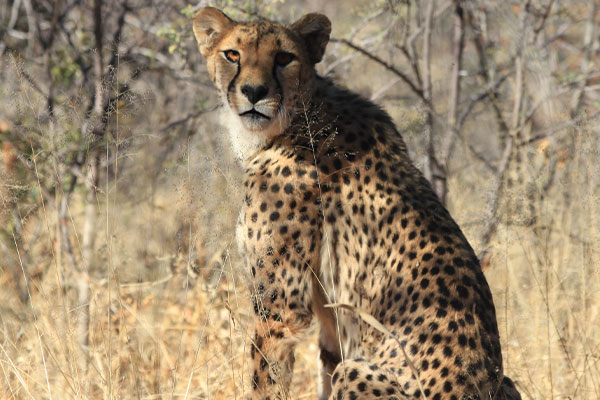
Rainbow (female) was found by a local farmer by the side of the road in February 2013 and brought back to his farm. After a week of trying to nurture her back to health, he called CCF to pick her up. CCF found Rainbow in a small cage, frightened and very thin. She was named Rainbow in honor of the bright rainbows seen during the drive to retrieve her. Rainbow has formed a coalition with Aurora, another rescued cub, and both are adjusting well to life at CCF and are popular with visitors.
Rocket
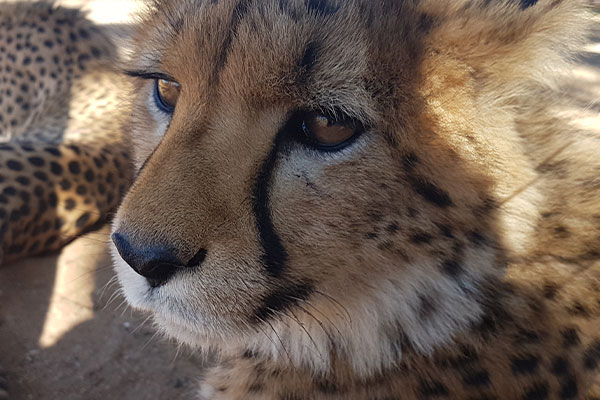
Rocket (HeChee) came to CCF at about 7 -8 weeks old in 2019. He was very small, tired and scared when he first arrived. The Ministry of Environment, Forestry and Tourism (MEFT) said that Rocket was caught by farmer after his dog was found chasing it. The farmer kept Rocket for a week and tried to get a permit to keep him but MEFT denied the request. Rocket was paired with Jaya who arrived shortly before he did. They became adoptive siblings and are very close now. The three can usually be found snuggling together in their enclosure.
Senay

Senay (female) is one of the four Okakarara Cubs, which were brought to CCF when they were only a few weeks old in September 2010. Senay and her brothers Khayjay and Peter, and her sister Tigerlily lived together and were being specially trained to be Ambassador Cheetahs. They served to teach visitors about the cheetah and its race against extinction. Senay works cooperatively with her handlers on her veterinary treatments and check-ups.
Teja
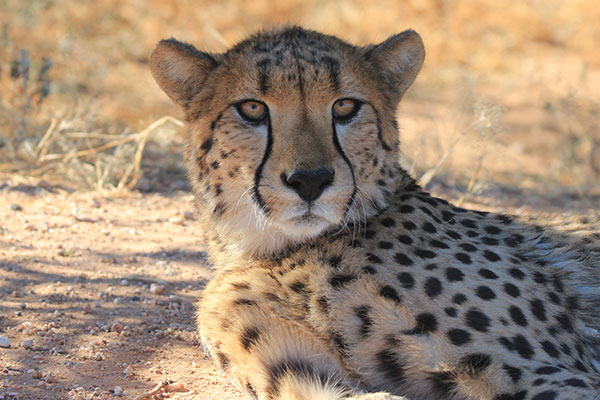
Teja (male) is a cheetah and one of three orphaned cubs (Hadassah – formerly named Shy, and Kora both females) born to a released female named Calypso. Calypso died from a snake bite shortly after giving birth, and the one-month-old cubs were rescued by CCF staff in March 2022. Teja was brought back to the main field center where he is being raised alongside her siblings and Kaveri.
Tigerlily
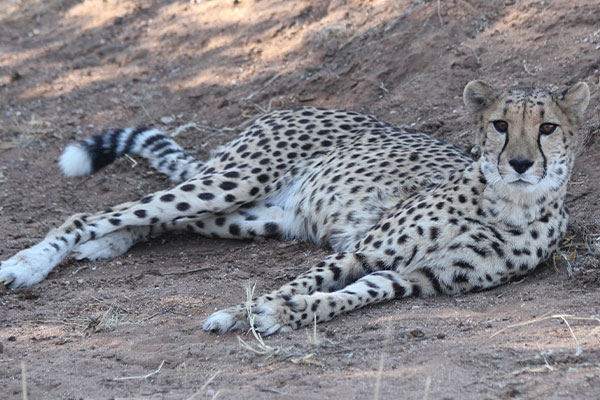
Tigerlily (female) is one of the four Okakarara Cubs, which were brought to CCF when they were only a few weeks old in September 2010. Senay and her brothers Khayjay and Peter, and her sister Senay lived together and were being specially trained to be Ambassador Cheetahs. They served to teach visitors about the cheetah and its race against extinction. Tigerlily works cooperatively with her handlers on her veterinary treatments and check-ups.
Zephyr
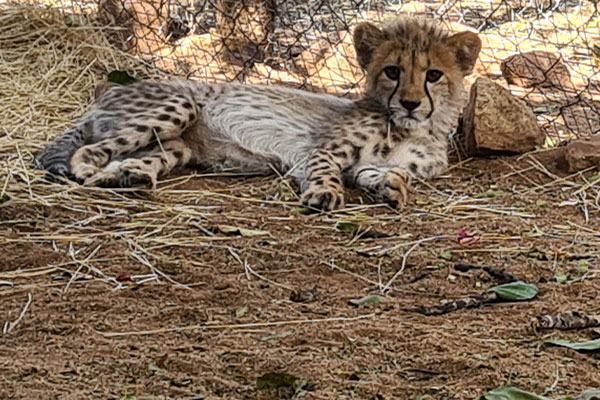
Zephyr (female) came to CCF in April 2024 after being found near Otjiwarongo, Namibia. She was one of three seven-week-old cheetah cubs found without their mother by local workers. Despite efforts to save all the cubs, who were weak, very thin, and dehydrated, one of the cubs died two days after arriving at CCF. Zephyr and her sibling Etango are recovering and healthy.
Cheetahs at CCF Somaliland
The Resident Cheetahs at CCF’s Cheetah Safe Houses were brought in as orphaned young cubs rescued from the illegal pet trade and human/wildlife conflict. For multiple reasons these cheetahs cannot successfully care for themselves in the wild so they cannot be released. Updates will be provided twice per year at the program level; updates on individual cheetahs are not possible at this time.
Livestock Guarding Dogs
CCF’s Livestock Guarding Dog (LGD) program is one of its most successful in addressing the human-wildlife conflict that threatens the cheetah.